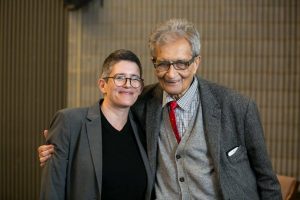Nobel Prize Winner and Health and Human Rights Scholar Amartya Sen at DLSPH
May 16/2017
As a firm believer that science must serve social needs and address inequality, I have always been keenly interested in human rights, social justice, health equity, and how these issues map onto public health policy and policy in general.
That’s why when I heard Professor Lisa Forman landed Professor Amartya Sen to give the keynote address at the Human Rights and the Social Determinants of Health international symposium on May 4, I was honoured to attend and reconnect with him.
Professor Sen and I were faculty members at Harvard University in the ‘90s and early ‘00s where I quickly learned that he’s an intellectual powerhouse who can debate just about anything, from welfare and development, gender and feminism, to legal, ethical, and moral philosophy. He is even affectionately referred to as the embodiment of the title of one of his most popular books, “The Argumentative Indian,” an academic pluralist with a rich knowledge of India’s history and idealism, and a sharp sense of humour.
Lisa and I are devoted followers of Professor Sen’s teachings on human development, human rights and global policy, and draw inspiration from Professor Sen’s passion. I was not surprised by the extraordinary response to the symposium, not only because of Professor Sen’s star power (he won the Nobel Prize for Economics in 1998), but also because people are hungry to engage in this topic.
There is growing mainstream recognition how social determinants — including income, gender, ethnicity, among others — influence health. At the core of these social determinants lie human rights and social justice, and yet many universities don’t offer programs exploring human rights norms, strategies, discourse and practice around health equity.
To address these broad-reaching themes in his keynote address — that was delivered to a packed auditorium on a rainy Thursday evening — Professor Sen reminded the audience that human rights are bedrock fundamental values. For proof of this concept, look no further than the greeting “Salute,” which in many languages translates to good health. He also unpacked why countries are obligated to help their people be healthy, stay well-nourished and remain active in their communities. From a global health perspective, he teaches that health is a human right that comes to every individual by virtue of being human, not by being a citizen of one particular country.
Watch Professor Sen’s keynote address
I am proud that DLSPH is one of few schools globally with an explicit focus on health as a human right, led by Lisa and many other leaders, including Professors Arjumand Siddiqi and Stephanie Nixon, who have produced exemplary work on the nexus of health, inequities, power and privilege. With the support of Lisa’s Canada Research Chair, the Faculty will continue to leverage its strengths in this area, including how human rights and global health intersect with philosophy, ethics and policy.
I would like to extend my thanks to Lisa for spearheading this event and expertly serving as moderator, and also to the Comparative Program on Health and Society at the Munk School for Global Affairs and the Lupina Foundation for their support. I would also like to recognize Priya Prabhakar, an MPH student at DLSPH, and Pragya Kaul, Program Coordinator of the Comparative Program on Health and Society, for supporting event logistics and communications.
My message to event attendees that I would like to repeat is that there are many strong roles that public health professionals can play to protect, advocate and enable human rights. We must all work together to protect human rights, shine a light on human rights abuses, and be ensure we leverage them to positively influence public health policy.
